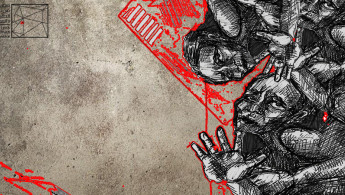‘Honour’ killings: three women murdered with impunity in Syria
The killings of three women in northern Syria in June and July 2021 have gone completely unpunished despite their murderers being identified, a new report reveals.
The two acts of femicide, in which three women were killed, were both committed by male relatives who were part of the Turkish-backed Syrian National Army (SNA), a report by the legal monitor Syrians for Truth and Justice (STJ) detailed. Both men were afforded protection by their respective armed groups and were not investigated by the ruling authorities of the area.
The report noted that these three murders are “just a few of a larger number of crimes committed against women.” It added that many of these crimes are “concealed under the thick veil of tribal or factional protection, or codes of honour that govern many Syrian communities.”
The first act of violence occurred in a displacement camp in Sarmada, Idlib. Timaa, a 22-year old displaced woman, and her mother were killed in their tent in an IDP camp by Timaa’s cousin. A photo of Timaa without her hijab had leaked to a Telegram group, enraging her male cousin, Raafat.
Her photo was posted in a Telegram group which is largely dedicated to “rumors and inflammatory posts that mostly incite violence against women and describe them using obscene language,” the STJ report said.
“Any woman who has information written about her or a picture shared online, especially on Telegram, is going to experience violence and severe beatings at the very least... most of the cases will result in murder,” Layan, the lead investigator of the STJ report, told The New Arab. These social media groups which exist to defame women pose a great danger to those they target, especially if they come from a conservative background.
“It is enough to post a photo and write two lines to hold her accountable. In very few cases, is there a search for evidence. More often than not, anger is the master of the situation. After the girl is murdered, the story is closed and shut,” she added.
|
Upon seeing the photo of his cousin, Rafaat travelled from his military post in Afrin to Idlib, and entered Timaa’s family tent, killing her and her mother.
He then called Timaa’s father and told him that he had murdered his daughter because of the picture posted to social media where she was not wearing a hijab. He added that he killed her mother for attempting to stop him from killing Timaa.
Rafaat then fled to Afrin, where he is posted as a fighter for the Suleiman Shah Brigade, also a faction within the SNA. The Suleiman Shah Brigade is alleged to have committed “systematic violations” against the Kurdish population of Afrin, including displacement. Its leader has also been accused of raping a young woman in the area at gunpoint - an accusation that has yet to be investigated by independent authorities.
The local authorities in Idlib, the extremist opposition faction Hayat Tahrir Al-Sham (HTS), did not investigate the deaths of Timaa and her mother, allowing the respective tribes of her father and her cousin Rafaat to settle the issue internally.
The tribe sought $24,000 from Rafaat for the killing of Timaa's mother but sought no recompense for Timaa’s murder. Timaa’s father chose not to press charges against Rafaat for the killing of his daughter.
The third woman, Nadiya, was killed by her husband, Salim, a fighter in the Sultan Murad Division.
The Sultan Murad Division is notorious for acts of torture against combatants, most notably during the 2019 Operation Peace Spring in northeast Syria, abduction and forcible marriages, use of child soldiers and acts of looting committed against civilians.
Nadiya, 19, told her family that she had been consistently physically abused by her husband throughout their five-year marriage, fleeing her husband a number of times.
She sought shelter with her relatives, who returned her to her husband each time.
“She would come to me and ask that I divorce her from him. I used to refuse due to the region’s traditions and customs which ordered women to show patience towards their husbands,” one of Nadiya's relatives said.
On the day of her murder, Nadiya video-called her family and begged to be rescued from her husband. Her mother noted that on the call she saw marks of “beatings and cigarette burns” on Nadiya’s body.
A few hours after the call, Nadiya was shot dead. Her husband insisted the death was a suicide, but two autopsies showed that she was shot from a distance which made it impossible to be a self-inflicted gunshot wound.
Nadiya’s death was not investigated due to her husband’s “good ties” with one of the Sultan Murad Division’s commanders, a fighter in the faction said.
These acts of violence against women are not the first to be documented in Syria this year. In early July, protesters in al-Hasakah in northeast Syria took to the street in anger after two girls were killed by their relatives in so-called honour killings. One of the victims had been chained up for over a year after her cousin raped her. Her father eventually strangled her to death.
“Honour killings and femicides remain rife across Syria despite the extensive coverage by the media and the massive efforts made by rights organizations to elevate women’s voices against the injustices they are exposed to,” the STJ report said.
The STJ changed the names of victims for the safety of their relatives.





 Follow the Middle East's top stories in English at The New Arab on Google News
Follow the Middle East's top stories in English at The New Arab on Google News
![The UAE is widely suspected of arming the RSF militia [Getty]](/sites/default/files/styles/image_330x185/public/2024-11/GettyImages-472529908.jpg?h=69f2b9d0&itok=Yauw3YTG)
![Netanyahu furiously denounced the ICC [Getty]](/sites/default/files/styles/image_330x185/public/2024-11/GettyImages-2169352575.jpg?h=199d8c1f&itok=-vRiruf5)
![Both Hamas and the Palestinian Authority welcomed the ICC arrest warrants [Getty]](/sites/default/files/styles/image_330x185/public/2024-11/GettyImages-2178351173.jpg?h=199d8c1f&itok=TV858iVg)